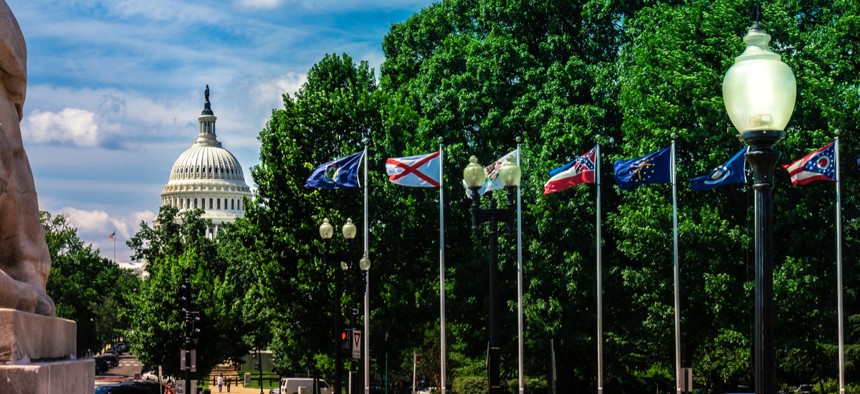There's Fresh Interest in Reviving an Old Intergovernmental Commission

Shutterstock
A U.S. House task force is looking at the possibility of a 2.0 version of the Advisory Commission on Intergovernmental Relations.
WASHINGTON — Legislation to create an updated version of a defunct intergovernmental affairs commission could emerge out of a House task force looking at the balance of power between levels of government, according to two lawmakers leading the task force.
The Speaker's Task Force on Intergovernmental Affairs held a hearing on Thursday to discuss the possibility of restoring a body like the U.S. Advisory Commission on Intergovernmental Relations, or ACIR.
Established in 1959, the commission was defunded in 1996 amid a push to cut federal agencies.
"I believe there is a strong case for reestablishing it," said Rep. Gerry Connolly, of Virginia, who is the top Democrat on the task force.
"It was a leading voice in identifying the increasing fiscal burdens placed on state and local governments," he added.
Connolly noted that the commission helped to develop the Unfunded Mandates Reform Act of 1995, which became law.
The ACIR was designed as a bipartisan body of 26 members who could study problems, programs and other intergovernmental matters.
Members included representatives of the White House, congressional lawmakers, governors, state legislators, mayors and county officials.
Connolly has a bill that would form a successor to the ACIR called the National Commission on Intergovernmental Relations.
Rep. Rob Bishop, a Utah Republican, chairs the Speaker's Task Force. Asked if he thought the group could produce legislation to form a new incarnation of the ACIR, he replied: "Yeah. It's got to be improved."
"We can't just reinvent what failed," Bishop said.
"If indeed we have an organization that has some accountability as to what the area of discussion is and to whom they actually report, and we can give them the ability of bringing groups together for something legitimate, that will be acceptable, we can do it," he added.
Connolly's bill is called the Restore the Partnership Act. He's yet to formally introduce it in this session of Congress and described it as a placeholder of sorts for what might eventually take shape.
Does the congressman see a path where he and Bishop can work across party lines on legislation to rekindle a group like the ACIR? "I do," he said. "I think both of us are committed to trying to do that."
"The need for it is pretty clear," Connolly added. "We need that platform for dialogue and improvement."
One of the people who testified at the hearing on Thursday was John Kincaid, executive director of the ACIR from 1988 to 1994, and now a professor of government and public service at Lafayette College.
He described it as problematic that Connolly's legislation more or less duplicates the old ACIR. This, he explained, is because the commission was forged originally in an era of greater bipartisanship.
Rising political polarization "rocked" the ACIR, he said, adding: "Today we're in a period when polarization is at an all time high."
Kincaid said reworking the membership of the commission and defining a clearer mission for it could help on this front.
He went on to offer the task force specific ideas on what the commission's activities might look like if it is revived.
For instance, advising the White House, Congress and state and local governments about the consequences of U.S. Supreme Court rulings, and highlighting aspects of congressional legislation that have to do with federal preemption of state or local authority.
Marcia Hale was director of the White House Office on Intergovernmental Affairs under the Clinton administration, and is the current president of Building America’s Future, a group that advocates for infrastructure investment. She also testified.
One of her recommendations was that any new ACIR-like panel should focus initially on topics that are not hyper-partisan. She flagged emerging automated vehicle technology as one possibility.
Former Maryland governor Parris Glendening told the task force that what tore the ACIR apart, in many ways, was the perception that its positions were being used as part of partisan debates.
And similar party-line pitfalls exist today, he suggested.
"The challenge, I think," Glendening said, "is the times."
Bill Lucia is a Senior Reporter for Government Executive's Route Fifty and is based in Washington, D.C.
NEXT STORY: Yanny or Laurel? Three State and Local Leaders Weigh In






